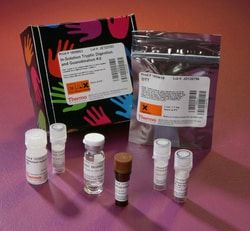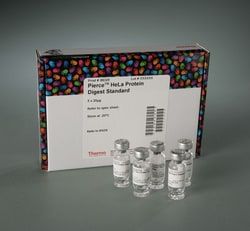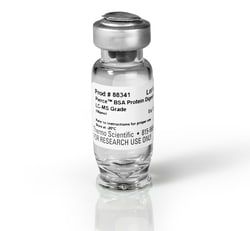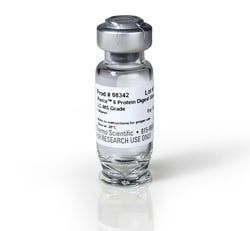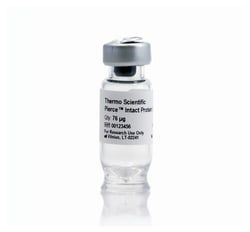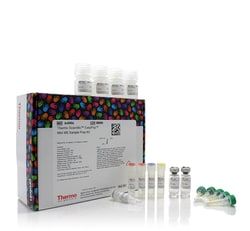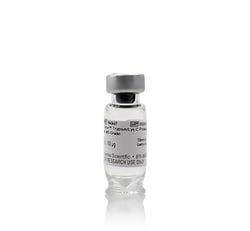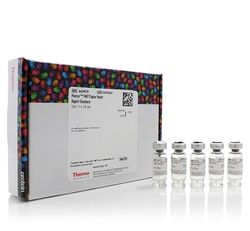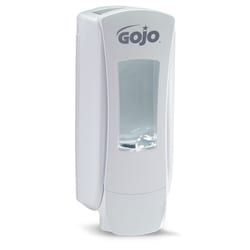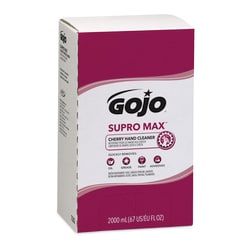7145675
Thermo Scientific™ Mass Spectrometry Grade Proteases
Improve sequence coverage and protein identification for mass spectrometry with high-quality, MS-grade proteases provided in stable liquid or lyophilized formats. Suitable for either in-solution or in-gel digestion workflows, each protease may be used individually or in combination to improve protein sequence coverage.
Manufacturer: Fischer Scientific
The price for this product is unavailable. Please request a quote
For Use With (Equipment)
Mass Spectrometer
Product Line
Pierce™
Detection Method
Mass Spectrometry
Workflow Step
Protein Digestion
Description
- Protein characterization, identification, and quantification by MS begins with efficient, reproducible protein digestion
- Sequence specific proteases are utilized to cleave proteins into smaller fragments or peptides
- Trypsin is the protease of choice for protein digestion
- However, separate or sequential digestion with alternative proteases can improve individual protein sequence coverage, or generate unique peptide sequences for different MS applications
- • Exceptional selectivity —trypsin has >95% C-terminal lysine and arginine specificity; LysC has >90% C-terminal lysine cleavage specificity • High purity —no detectable chymotrypsin activity (trypsin) • Complete digestion —trypsin/LysC enzyme combination reduces tryptic missed cleavages • Enhanced stability —trypsin chemically modified for reduced autolytic activity • Convenient —enzymes provided in stable lyophilized or liquid formats Trypsin Protease is a mass spectrometry (MS)-grade serine protease derived from porcine pancreatic extracts that specifically cleaves at the carboxyl side of lysine and arginine residues
- The enzyme is TPCK-treated to eliminate chymotryptic activity and chemically modified by methylation, yielding a highly active and more stable form of the enzyme
- Trypsin Protease can tolerate commonly used partially denaturing conditions, such as 0.1% SDS, 1 M urea, and 10% acetonitrile
- Trypsin Protease is most active at pH 7 to 9 and can be reversibly inactivated at pH < 4
- Trypsin can be purchased lyophilized in 1-mg 5-packs of 20 μg or 100 μg quantities and in solution at 100 μg
- Lys-C Protease is a mass spectrometry (MS)-grade serine protease isolated from Lysobacter enzymogenes
- Lys-C Protease has high activity and specificity for lysine residues, resulting in larger peptides and less sample complexity than trypsin (i.e., fewer peptides)
- Unlike trypsin, Lys-C Protease can cleave lysines followed by prolines, making it ideal for sequential protein digestion followed by trypsin to decrease missed cleavages
- These unique Lys-C Protease properties ensure high digestion efficiency when used alone or followed by tryptic digestion
- Additionally, Lys-C prototypic peptides typically have higher charge states, making it an enzyme of choice for use with ETD fragmentation
- Lys-C Protease is commonly used in phosphopeptide enrichment workflows because it generates peptides with primary amines at both the N- and C-terminus, allowing the fragments to be double-labeled with amine-reactive isobaric tags
- This results in enhanced peptide ionization and improved limits of quantitation since more fragment ions can be re-isolated during MS3 acquisition
- This enzyme can be used for in-solution or in-gel digestion workflows to produce peptides for LC-MS/MS protein identification
- Efficient protein digestion can be completed in two hours at 37°C
- Lys-C Protease remains active in highly denaturing conditions, such as 8 M urea, 2 M guanidine-HCl, 1% SDS, 2% CHAPS, and 40% acetonitrile, and functions well at pH 7–9 (maximal activity at pH 8)
- This lyophilized enzyme has a mass of 30 kDa and is stable for one year when stored at –20°C
- This Lys-C enzyme is packaged lyophilized (20 μg or 100 μg quantities)
- Trypsin/Lys-C Protease Mix is a lyophilized mixture of trypsin and LysC proteases that has been optimized to improve digestion efficiency of proteins
- Although trypsin is routinely used for protein digestion, this protease alone is not sufficient to fully digest proteins at the carboxyl-end of lysine and arginine residues
- Therefore, Lys-C protease is commonly combined with trypsin to sequentially digest proteins with fewer missed cleavages
- Trypsin/Lys-C Protease Mix is provided in flexible formats of 20 μg, 5 x 20 μg, or 100 μg
- Digestion can be completed in as little as 1.5–3 hours or up to overnight, depending on enzyme to protein ratio
- Chymotrypsin, GluC, Asp-N Proteases • Increased sequence coverage—better protein characterization results from overlapping peptides with complementary chromatographic, ionization, and fragmentation properties • High specific activity—each protease has excellent enzymatic specificity • Stable—provided in a lyophilized format Asp-N Protease is an MS-grade zinc metalloproteinase derived from a mutant strain of Pseudomonas fragi and requires a trace amount of zinc for activity
- Asp-N Protease cleaves primarily at the amino side of aspartate and cysteic acid that results from cysteine oxidation
- Cleavage can also occur at glutamic acid; however, the rate of cleavage at the glutamyl residue is significantly lower than the rate of cleavage at the aspartic acid residue
- Asp-N Protease can efficiently digest protein in 2–20 hours at 37°C with activity greater than 20,000 units/mg protein and remains active under denaturing conditions, such as 1 M urea, 2 M guanidine·HCl, 0.1% SDS, 2% CHAPS, and 10% acetonitrile, with optimal activity at pH 6–8
- This lyophilized enzyme has a mass of 27 kDa and is stable for one year when stored at -20°C
- Glu-C Protease , also referred to as V-8 protease, is an MS-grade serine protease isolated from Staphylococcus aureus
- Glu-C Protease specifically cleaves the carboxyl side of glutamic acid residues in ammonium bicarbonate and ammonium acetate buffers, generating a limited number of peptide fragments
- Cleavage can also occur at both glutamic and aspartic acid residues in phosphate buffers
- Glu-C Protease can efficiently digest protein in 5–18 hours at 37°C with activity greater than 500 units/mg protein and remains active under denaturing conditions, such as 2 M urea, 1 M guanidine·HCl, 0.1% SDS, 2% CHAPS, and 20% acetonitrile
- Glu-C Protease activity is optimal at pH 8
- This lyophilized enzyme has a mass of 27 kDa and is stable for one year when stored at -20°C
- Chymotrypsin Protease is an MS-grade endoproteinase isolated from bovine pancreas that specifically cleaves at the carboxyl side of tyrosine, phenylalanine, tryptophan, and leucine
- Two predominant forms of chymotrypsin protease, A and B, are found in equal amounts in bovine pancreas
- They are similar proteins (80% homology) but have different proteolytic characteristics
- Both forms of chymotrypsin protease are present in Thermo Scientific Chymotrypsin Protease
- Since trypsin may co-purify with chymotrypsin protease derived from natural sources, Chymotrypsin Protease has been treated with TLCK to eliminate potential tryptic activity, improving digestion specificity
- Chymotrypsin Protease can tolerate mild denaturing conditions, such as 0.1% SDS, 2 M urea, 2 M guanidine·HCl, 1% CHAPS, and 30% acetonitrile, with optimal activity at pH 7.5–8.5
- This lyophilized enzyme has a mass of 25 kDa and is stable for one year when stored at -20°C.
